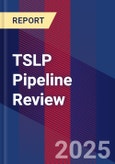This product provides basic information on approved drugs and drug candidates in research and development targeting thymic stromal lymphopoietin (TSLP) or its receptor (TSLP-R).
Thymic Stromal Lymphopoietin (TSLP) is a cytokine that is a key driver of the inflammatory response in major allergic and inflammatory diseases, such as asthma, where disruption of TSLP signaling has been clinically validated as an effective therapeutic strategy. TSLP is implicated in the pathogenesis of atopic dermatitis, asthma and other eosinophilic and Th2 immune-related diseases.
TSLP signaling is one of the first events in the inflammatory cascade stimulated by allergens, viruses, and other triggers. TSLP signaling activates downstream targets such as IL-4, IL-5, IL-13, IL-17 and IgE. Because TSLP is a target upstream in the inflammatory cascade, there is opportunity to address disease at its root, prior to the influence of other disease-related cytokines. Blocking the TSLP receptor presents an opportunity for a single treatment to impact the drivers of multiple pathological inflammatory processes across a broad set of diseases.
This product consists of:
- Competitors described in a tabular format covering drug code/INN, target(s)/MoA, class of compound, territory of main competitor, indication(s) & R&D stage.
- Project History with link to source of information (press release, homepage, abstracts, presentations, annual reports etc).
- One-month online access to the publisher’s database for TSLP inhibitors (prerequisite: access to internet).
Thymic Stromal Lymphopoietin (TSLP) is a cytokine that is a key driver of the inflammatory response in major allergic and inflammatory diseases, such as asthma, where disruption of TSLP signaling has been clinically validated as an effective therapeutic strategy. TSLP is implicated in the pathogenesis of atopic dermatitis, asthma and other eosinophilic and Th2 immune-related diseases.
TSLP signaling is one of the first events in the inflammatory cascade stimulated by allergens, viruses, and other triggers. TSLP signaling activates downstream targets such as IL-4, IL-5, IL-13, IL-17 and IgE. Because TSLP is a target upstream in the inflammatory cascade, there is opportunity to address disease at its root, prior to the influence of other disease-related cytokines. Blocking the TSLP receptor presents an opportunity for a single treatment to impact the drivers of multiple pathological inflammatory processes across a broad set of diseases.








